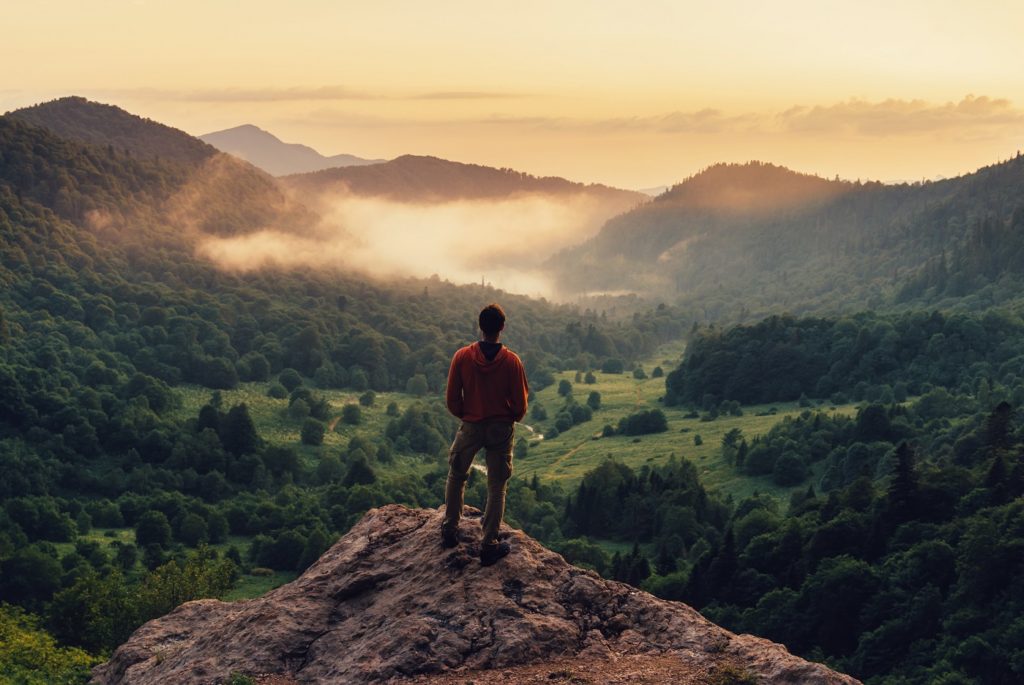I’ve spent some time this summer driving through parts of the American West. Even though I grew up in the West, I’ve lived on the East Coast long enough to be startled anew at the open space, big skies, and sheer enormity of it all—the mountains are big, the canyons deep, the rivers fast. More than anything, though, is the sense of distance and emptiness. From Princeton it takes roughly an hour to be in New York or Philadelphia with their millions, while an hour of driving from Butte, Montana or Moab, Utah, feels like a blip given the distance yet to travel and the amount of desert or grassland ahead.
Still, despite the immensity, and sometimes harshness of the land and climate, and the staggering improbability of surviving a journey by covered wagon or handcart, the land is settled. I simply cannot conceive the amount of effort required to build the railroads through the Rocky Mountains, or the interstate system, or the canal and irrigation networks in Utah.
Of course, each of these examples is open to debate and objection, and I’m well aware of the troubles of history and disputes about land and environment. My point is simply to note the sheer amount of will and effort—unimaginable, I think, to many contemporaries—required to arrive in a place like the Great Salt Lake and turn it into Salt Lake City as it currently is.
There is a strange contradiction in the dominant vision of the human being held by many. On the one hand, we celebrate autonomy, freedom, and self-creation. Yet, at the same time, there is a strong commitment to determinism: all is determined and strongly conditioned by genes, structures of power, race, or class. We celebrate individual freedom and the ability to create a version of ourselves however we see fit, even as there is, I believe, a growing sense of disenfranchisement, alienation, helplessness, and despair. It seems to me we are no longer an optimistic people, and many express a sense of decline, decadence, and fragmentation.
Start your day with Public Discourse
Sign up and get our daily essays sent straight to your inbox.I don’t myself believe in determinism in any form. I deny theological determinism, for God establishes rather than squelches our freedom. Our genes condition our lives, and in those conditions, we then act and are responsible for our action. So, also, social structures, family dynamics, race, gender, class, and national histories all make the world into which we are thrown, in which we find ourselves as agents and persons. We are acting persons, and we are free.
It seems to me we are no longer an optimistic people, and many express a sense of decline, decadence, and fragmentation.
All times have their challenges and struggles—ours too. In this featured collection from the Public Discourse archives, we remind ourselves of our ability to act, rejecting any sense of hopelessness or inevitability in any and all of our political discussions.
First, Andy Smarick, in a relatively recent essay, suggests that conservatives not simply preserve old institutions but actively create new ones. To conserve is not simply to persist in the status quo but to adapt and engage as necessary, with intelligence and verve. Things sometimes break down, and we then build anew.
Second, as we enter into yet another round of COVID restrictions, my own essay, “Pandemics and the Agency of Citizens,” argues for the proper necessity of science and public health experts, but also for responsible political self-determination. In the end, science cannot through science adjudicate values or public goods; it’s just not what science does. Instead, free people are citizens and agents and must do the hard work of political choice.
Finally, Rachel Lu makes an interesting case for subsidiarity in the challenges facing families and mothers and the “women’s issues.” Rather than politicians telling families what they need, politicians should open opportunities for individuals and families to seek the good in their own way, through their own intelligent understanding and choice. We’re not isolated islands, but we are actors who, ultimately, must act.
These three essays are not obviously related by any explicit theme or subject matter. What they share is the underlying sense of human anthropology that recognizes and respects the human person. Yes, there are difficulties and debates, but nothing is ever all lost.
So, to work we go, as we always have, with a spirit of adventure and hopefulness.











